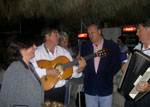 |
 |
Part I. Cultural, social and institutional effects and place of digital libraries. Digital libraries are a world wide success, even though they are barely a decade old. Technology provides unprecedented access to a growing number of digital resources and library services. Digital libraries have spread in many fields, areas and institutions. Growth in their use is extraordinary. Numerous innovative practices have been developed and more are underway that account for this success and increased use globally. In fact, digital libraries are becoming a phenomenon with wide spread effects above and beyond libraries proper. The goal of the first part of LIDA 2006 is to explore the place and role of digital libraries in the wider realm of culture and society, as well as in the specific realm of organizations or institutions where they are housed. Of interest is to examine the effects that digital libraries have on social and cultural environment and on institutional practices. Included are role and effects of digital libraries in specific areas, such as education, science, humanities, scholarship, publishing or given disciplines and professions, and as related to specific cultural and social institutions, such as museums, academies, historical societies, or government, as well as specific institutions, such as universities, academic departments, research institutes, hospitals and the like. Contributions cover research and scholarly papers and posters. Invited are contributions (types described below) covering the following topics:
Part II. Building a digital library for children and young adults A variety of libraries (and not only libraries but other institutions and organizations of all shapes and sizes) are concerned with building or improving a digital library in their own domain, and for their users. As a consequence, digital libraries are reaching out to specific audiences and providing digital resources and services geared toward that audience. Traditionally, libraries all over the globe have successfully developed and provided collections and services for children and young adults. Now they are moving in a big way to develop and provide digital library resources and services for that audience. Besides being challenging, this is a highly motivated area, with great potential and prospects, some of them already realized. The goal of the second part of LIDA 2006 is to share experiences from practice and research in development and operation of digital library resources and services specifically devoted to children and young adults. This involves existing state-of-the-art resources and services, as well s those that are on the drawing board or are contemplated for the future. On the practical side included are statements of principles and examples of best practices. On the research side, invited are examples of use of study results in areas such as literacy in information age in development of digital libraries for children and young adults. Contributions cover papers, posters, workshops and demonstrations. Contributions are invited that approach building, maintaining, and improving digital libraries for children and young adults from a number of perspectives. These include:
|
    
|
Last revised: July 5th 2006. |